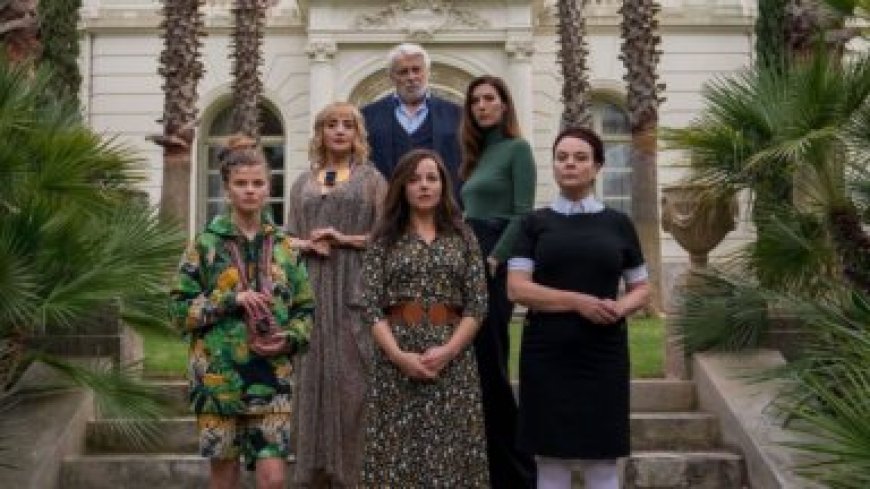Lesbian’s family reunion leaves more questions than answers in ‘The Origin of Evil’
Out gay director Sébastian Marnier’s “The Origin of Evil” is a juicy tale of deception and murder. The film follows Stéphane (Laure Calamy), a lesbian who works packaging anchovies, rents a room in an old woman’s house, and periodically visits her lover (Suzanne Clément) in prison. Stéphane has a very ordinary life until she reconnects … Read More

Out gay director Sébastian Marnier’s “The Origin of Evil” is a juicy tale of deception and murder. The film follows Stéphane (Laure Calamy), a lesbian who works packaging anchovies, rents a room in an old woman’s house, and periodically visits her lover (Suzanne Clément) in prison. Stéphane has a very ordinary life until she reconnects with her long-lost father, Serge (Jacques Weber), an obscenely wealthy man who is now remarried to Louise (Dominique Blanc), a syllogomaniac — she purchases and hoards things — and has two adult daughters, George (Doria Tillier), and Jeanne (Céleste Brunnquell).
The father/daughter reunion is a bit awkward. Taken to his estate, Stéphane enters a room of taxidermied animals, and is greeted warmly by Louise and coldly by Serge’s daughters as well as the family housekeeper, Agnès (Véronique Ruggia Saura). Over lunch, filmed in a nifty split screen to keep the conversation lively, Stéphane lies about co-owning the fish factory where she works. The sequence ends with Marnier showcasing a Venus flytrap killing its prey, as if viewers needed a visual reference that someone is going to be devoured in this luxurious hothouse.
“The Origin of Evil” takes a slow burn approach before it reveals what exactly is afoot. Serge has had a stroke, and his fainting spells are a concern to his wife and daughters as well as Stéphane. The family is battling for control of his estate, and Stéphane’s unexpected arrival is a fly in the ointment. But is Stéphane whom she claims to be? No one suggests Stéphane take a DNA test, but when she is asked for ID — her purse has been emptied by others — Stéphane simply explains it has been stolen. George adamantly tells Stéphane not to come back. Serge, however, insists Stéphane testify at a hearing to maintain control of his estate. It is only after a series of Stéphane’s prison visits with her lover that the truth of what is going on is revealed.
Marnier plays with audiences to the same degree that Stéphane and Serge and his family play with the truth. The film’s tension builds as Stéphane has to navigate all the duplicity. And things get complicated when she is told by Serge that she has a brother — and that he died — only to later learn, from someone else, that Serge’s son is not dead. What is the truth?
“The Origin of Evil” does feature a few scenes that are meant to complicate things, but they largely serve to draw out the story and create ambiguities. When Stéphane moves in with her work colleague, Leila, the women share a kiss, but their relationship is never fully explained. And while Stéphane does testify at the estate hearing, she recounts things that may or may not have happened. Once Stéphane ghosts her incarcerated lover, it sets off a chain of violence and the film gets more interesting — with various characters sharing secrets and lies and behaving badly — but the payoff somehow feels mild.
It is easy to root for Stéphane because Calamy makes her both vulnerable and cunning. She tries to ingratiate herself with Serge’s family, with mixed results, but she displays a steeliness that belies her unease — especially when she is confronted by someone who might expose her as a fraud. Calamy is fun to watch as she schemes, lying to her manager at the fish factory about her father having a stroke, storming out of the workplace, and then dancing through the hallway on her way out the door. The actress seems to relish playing slippery here, and her emotional testimony is darkly funny because she sells it.
In support, Dominique Blanc makes Louise a caricature, which provides the film with some campiness — she moves to sit on a celadon green sofa, as it is “a better match” for her leopard-print caftan. Her character is the comic relief, sparring with Serge about spending his money, and asking Stéphane for help with her large VHS tape collection. The other female characters are uneven. Doria Tillier is mostly severe as George, but there is a nice twist when she comes to appreciate Stéphane in one pivotal scene. The film could have done more with her, whereas Céleste Brunnquell is completely underused as Jeanne to the point where her character is superfluous. As Stéphane’s lover, Suzanne Clément gets a meaty role she really sinks her teeth into.
“The Origin of Evil” provides sufficient fun as these greedy women try to best the rich patriarch. The feminist themes peek out at times to provide some context for all the conniving. Marnier also keeps the film stylish, utilizing a split screen especially in one key sequence that reveals an imminent threat. The filmmaker could have created a more effective mousetrap, but his sly thriller ends with a shot that leaves viewers both guessing and satisfied.
“The Origin of Evil” | Directed by Sébastien Marnier | Opening September 22 at the IFC Center | Distributed by IFC Films

 Mark
Mark 





